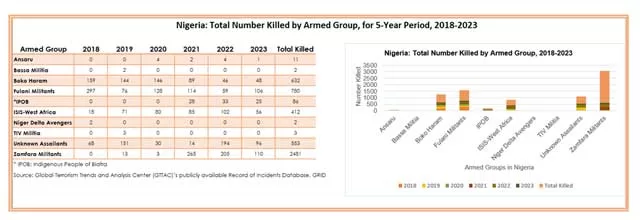On the Global Peace Index 2023, measuring a country’s peacefulness, Nigeria ranked 144 out of 163 countries with a deteriorating score of 0.049 per cent. Additionally, according to the Crisis Group, in April 2024, “Jihadist-related insecurity persisted in the North East, while bandits continued killings and mass abductions.” Other authoritative sources of consequence such as the Global Terrorism Trends and Analysis Center (GTTAC), which partners with the Terrorism, Transnational Crime and Corruption Center (TraCCC), at George Mason University, have evidence of these armed activities being a long and persistent occurrence in Nigeria. Figure 1, shows us this unfortunate and grim reality.


Figure 1: Nigeria: Total Number Killed by Armed Group, for 5-Year Period, 2018-2023
At the vanguard of these efforts, is Ambassador Carson, who recently played the integral role of strategic engagements with 10 governors of northern Nigeria, by facilitating a panel discussion at USIP, on April 23. This Strategic Conversation with Nigeria’s Governors underscored the true extent, and multifaceted nature, of both the challenges at hand, as well as the key imperatives for U.S.-Nigeria collaborative solutions.
Ambassador Carson has talked about Nigeria’s preeminent stature on the African continent and why its stability is a matter of paramount importance, not only for Nigeria, but also for Africa, the United States, and the world. The escalation of armed violence by non-state armed groups, in the country’s northern parts, is being perpetrated by the religious jihadist group Boko Haram. This led to persistent, armed violence since the late 2000s, which is still proving to be quite a formidable threat to national security and regional stability.
Ambassador Carson’s Foreign Service career, which spans appointments in diverse countries that also include Botswana, Mozambique, Nigeria, and Portugal, has endowed him with a nuanced appreciation of the cultural and socio-political dynamics that shape instability-solving, diplomacy efforts. It is this wealth of experience, coupled with his tenures serving in various US administrations, from former Presidents George W. Bush, Bill Clinton, and Barack Obama. And more recently, serving in the Biden administration, as special presidential representative for U.S.-Africa Leaders’ Summit Implementation. These are the roles that have equipped him with a multidimensional perspective that transcends more simplistic narratives.
The history of Ambassador Carson’s diplomatic endeavors has been rooted in an intimate understanding of the nuanced issues, including the problem’s origins and the different component challenges that the people of Nigeria government officials, in both the U.S. and Nigeria, face. His decade-long, diplomatic efforts to facilitate dialogue between northern Nigerian governors and Washington policymakers began in 2014, when he spearheaded initiatives to bring the leaders of Nigeria’s states, to Washington, the American capital.
These strategic conversations have proven invaluable in fostering partnerships, catalyzing cooperation, and cultivating a deeper comprehension of the intricate dynamics at play. The recent U.S. Institute of Peace panel discussion, convened for Nigeria’s governors, including from Nigeria’s middle belt region, served as a platform for sharing experiences and ideas, and coming up with practical strategies to fight insecurity.
A core element of Ambassador Carson’s approach has been recognizing that kinetic solutions, on their own, are not enough to solve the complex challenges, a key step of course. Instead, he has championed a holistic, resilience-focused model that encompasses non-kinetic approaches, such as building community resilience, strengthening civilian-military relations, and enhancing the delivery of social and economic benefits.
Drawing on the experiences of other countries that have grappled with insurgencies, Ambassador Carson emphasized just how multidimensional effective responses need to be. His peace advocacy work, a blend of economic, political, and social strategies, buttressed by leadership and sufficient resources, does resonate with the principles of modern conflict resolution.
Notably, Ambassador Carson’s diplomatic work has gone beyond the realm of security, encompassing vital domains such as economic development and business relations. The USIP strategic engagement facilitated meetings between the Nigerian governors and senior U.S. government officials, congressional staffers, and influential private sector entities, fostering an understanding of the tools and resources available to address their challenges in a holistic way.
As Ambassador Carson clearly articulated, the decentralized nature of Nigeria’s federal system makes its governors—sub-national leaders—take on tremendous responsibilities not dissimilar to their American counterparts. For this reason, his efforts to cultivate relationships, disseminate knowledge, and forge partnerships with both government and non-government actors in Washington, have been pivotal in empowering Nigeria’s governors as they confront the daunting obstacles they are currently facing. As the 2013 “The Changing Nature of Diplomacy” by Andrew F. Cooper tells us, there are many different craft of diplomacy initiatives that can be used in the 21st century.
In the chronicles of modern diplomacy, Ambassador Carson’s engagement with northern Nigerian governors is both a historical and current testament to the enduring power of dialogue, cooperation, and a comprehensive approach to conflict resolution. By fostering strategic conversations, nurturing partnerships, and advocating for multidimensional strategies, he has charted a path of restoring stability and prosperity, and increased U.S-Nigeria relations.
Ambassador Carson’s diplomatic efforts serve as a beacon of hope, illuminating the potential for constructive engagement, mutual understanding, and the collective pursuit of a path to solving the still formidable obstacles long hindering progress in northern Nigeria, and a more harmonious global order, for a world still contending with complex terrorism and insecurity issues.
